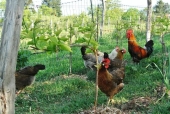




 1
1




 1
1




 1
1












 for me) and I am concerned that for chickens, possums would just jump down from the trees here in Texas. (we used the electric fencing in the past only for goats and cows and were not very successful.
for me) and I am concerned that for chickens, possums would just jump down from the trees here in Texas. (we used the electric fencing in the past only for goats and cows and were not very successful.
![Filename: ourland.jpg
Description: pic of the new place(all the trees) [Thumbnail for ourland.jpg]](/t/32681/a/14975/ourland.jpg)












 2
2




J.D. Ray wrote:We're still city folks (with plans to escape), with no livestock, so not any practical experience here.
My wife keeps a 30 gallon trash can outside the back door that she throws food scraps in. Last weekend, she asked for help to take it out to the back raised bed and dump it, as it was full (nearly too full, as the handles almost broke). As I poured it out, I saw probably thousands of dead maggots, drowned it seemed it the sluice. I thought back to something I'd read here or seen in one of Paul's videos about the fly larvae buckets, where people were finding that the road kill-and-straw filled feed producers were also producing disease, in the form of E-Coli or similar bacteria transferring from the roadkill to the chickens through the larvae. I wonder if the same disease problem would exist if the maggots were grown in a vegetarian compost bucket.
Any thoughts?
Thanks.
JD







Bev Huth wrote:E. Coli is natural in most animal guts, ours included but, my meat bird do get maggots form the quail droppings and, they get the rabbit droppings. I feel that as long as I am clean (don't rupture the innards) when butchering and, cook the chicken properly, it's fine. That's my choice and we have never had a problem because of our choice in feeding but, it's your call.
I would not feed maggots off road kill, no telling what diseases or other parasites that animal may carry. Now if I butcher the animal and can inspect the organs and such, then yes I will use the lungs to grow maggots for the birds, but not the digestive track.
Sustainable Plantations and Agroforestry in Costa Rica




Xisca - pics! Dry subtropical Mediterranean - My project
However loud I tell it, this is never a truth, only my experience...








Find me at http://www.powellacres.com/

| I agree. Here's the link: http://stoves2.com |




